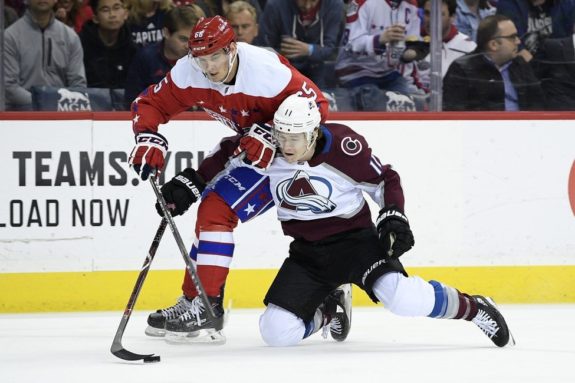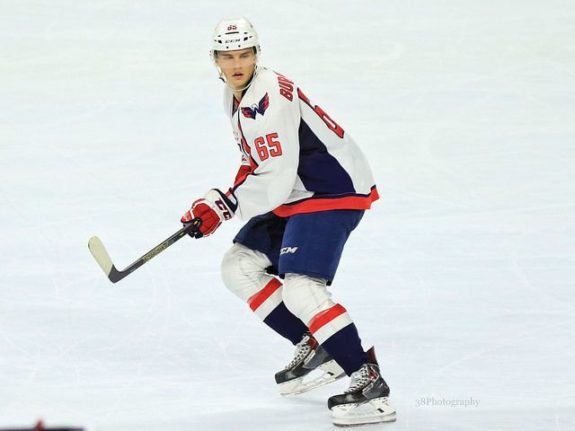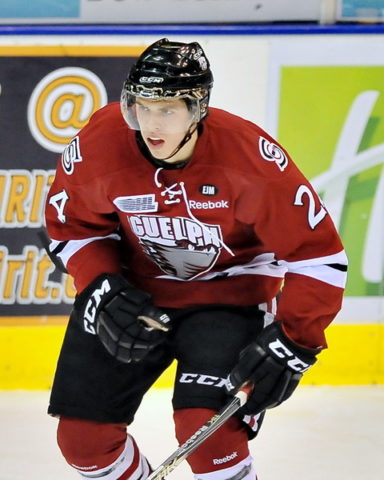Washington Capitals general manager Brian MacLellan can check one more box off his offseason to-do list.
Four days after extending a $3.25 million qualifying offer to Andre Burakovsky, the Capitals accepted a trade offer to send the restricted free agent forward to the Colorado Avalanche. In exchange, the Capitals will receive fellow free agent forward Scott Kosmachuk, as well as the Avs’ second and third-round picks for the 2020 NHL Entry Draft.
Until the deal went down, trade rumors had swirled around Burakovsky for weeks, peaking at the NHL Draft. However, MacLellan was not prepared to give away his 2013 first-round draft pick for nothing, and no trade surfaced on draft day.
What They Gave Away

Burakovsky, the Capitals’ first-round draft pick in 2013, never quite lived up to the hype that surrounded him upon his NHL debut. While he showed flashes of his potential during the team’s 2018 Stanley Cup run, including his two goals during Game 7 of the Eastern Conference Final against the Tampa Bay Lightning, his play never developed the way the team hoped it would.
His peak so far has been his sophomore season in 2016-17, where he picked up 17 goals and 38 points while missing only three games. Since then, his performance stagnated despite the occasional heroic effort, and in 2018-19, he finished with 12 goals and 13 assists in 76 games – the same scoring totals he racked up the season before in only 56 games.

According to MacLellan, it was Burakovsky who requested the trade, as he wanted a better chance to play in a top-six role somewhere – an opportunity which had passed him by with the Capitals. MacLellan insists that if Burakovsky was willing to accept a third-line role, he would have kept the forward in Washington.
“Probably a little frustrated over his role in the past season and viewed it as, you know, getting a little stale,” said MacLellan at a press conference. “I think, when he averaged 11 minutes with us…he’s a little frustrated with it, and so we tried to help him out and find him a good spot.”
Patching the Hole
While the loss of Burakovsky leaves a hole to be patched on the third line, the Capitals’ salary cap crunch may hinder their ability to do so. Brett Connolly, who had a career year in 2018-19, could fill that role if the Capitals retain him. However, Connolly is an unrestricted free agent, leaving him open to competing offers. Per WTOP sports reporter Brian McNally, MacLellan has all but given up on the idea of keeping Connolly in Washington.
Other options are on the table, such as Vegas Golden Knights forward Brandon Pirri, who himself had a breakout year at the age of 28 filling a similar role to Burakovsky, scoring 12 goals in only 31 games. According to CapFriendly.com, the Knights are in the worst salary cap position in the league, and may not be able to afford his services, leaving other teams able to scoop him up for just over the league minimum.
Another, slightly longer shot is Joonas Donskoi of the San Jose Sharks, a 27-year-old unrestricted free agent who also acheived career-best numbers in the 2018-19 season. Playing in all but two games, Donskoi picked up 14 goals and 23 assists. Unfortunately, that success has made him a target for many other teams, making it unlikely that the cash-strapped Capitals will make a tempting offer.
What Did They Get Back?
One of the draft picks received in the trade came second-hand. The Avalanche had just received that third-round pick from the Arizona Coyotes in another deal on Tuesday, shipping center Carl Soderberg to the desert for the privilege.
Both teams’ performances are on the upswing after years of decline, which makes it all the more unlikely that Washington will see a major jump in their draft position in either round, if any. In 2018-19, Colorado returned to the playoffs and even managed to reach the second round, while Arizona, rejuvenated by new ownership, drastically improved their standing and barely missed out on a playoff spot after finishing as the worst team in the Western Conference the season before.

The one player the Capitals received in the deal, 25-year-old Kosmachuk, has spent the majority of his career in the American Hockey League, playing for four teams in the past five years. The most recent team on his resume is the Colorado Eagles, where he scored 12 goals and 13 assists in 54 games for the first-year AHL club.
Apart from that, his only NHL experience came late in the 2015-16 season for the Winnipeg Jets, where he played the final eight games of the regular season. As Kosmachuk is an unrestricted free agent, there’s no guarantee the Capitals will retain his rights into the upcoming season.
Perhaps the most important component of the Burakovsky deal doesn’t involve any of the players, whether named now or later. With Burakovsky’s contract no longer a concern, the Capitals remain less than $9.25 million under the NHL salary cap. If Burakovsky had signed, that number would have been below $6 million, leaving precious little room for remaining free agents.
Of course, an extra $3 million only amounts to one or two more signings, and the Capitals still have high-priority restricted free agents such as Jakub Vrana and Christian Djoos to focus on.